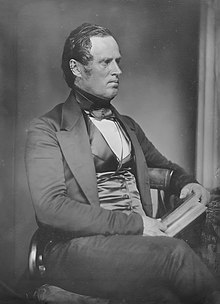George Nixon Briggs | |
|---|---|
 Portrait c. 1848 | |
| 19th Governor of Massachusetts | |
| In office January 9, 1844 – January 11, 1851 | |
| Lieutenant | John Reed, Jr. |
| Preceded by | Marcus Morton |
| Succeeded by | George S. Boutwell |
| Member of the U.S. House of Representatives from Massachusetts | |
| In office March 4, 1831 – March 3, 1843 | |
| Preceded by | Henry W. Dwight |
| Succeeded by | Julius Rockwell |
| Constituency | 9th district (1831–1833) 7th district (1833–1843) |
| Member of the Massachusetts House of Representatives | |
| Personal details | |
| Born | April 12, 1796 Adams, Massachusetts, US |
| Died | September 12, 1861 (aged 65) Pittsfield, Massachusetts, US |
| Political party | Whig |
| Spouse | Harriet Briggs |
| Children | Harriet Briggs George Briggs Henry Shaw Briggs |
| Profession | Lawyer |
| Signature | |
George Nixon Briggs (April 12, 1796 – September 12, 1861) was an American lawyer and politician from Massachusetts. A Whig, Briggs served for twelve years in the United States House of Representatives, and served seven one-year terms as the 19th Governor of Massachusetts, from 1844 to 1851.
Raised in rural Upstate New York, Briggs studied law in western Massachusetts, where his civic involvement and successful legal practice preceded statewide political activity. He was elected to Congress in 1830, where he supported the conservative Whig agenda, serving on the Committee on the Post Office and Post Roads. He was also a regular advocate of temperance, abstaining from all alcohol consumption.[1]
He was nominated by the Whigs in 1843 to run against Democratic governor Marcus Morton as part of a Whig bid for more rural votes, and easily won election until 1849. Although he sought to avoid the contentious issue of slavery, he protested South Carolina policy allowing the imprisonment of free African Americans. He supported capital punishment, notably refusing to commute the death sentence of John White Webster for the murder of George Parkman. Briggs died of an accidental gunshot wound at his home in Pittsfield, Massachusetts.
- ^ Giddings, p. 66